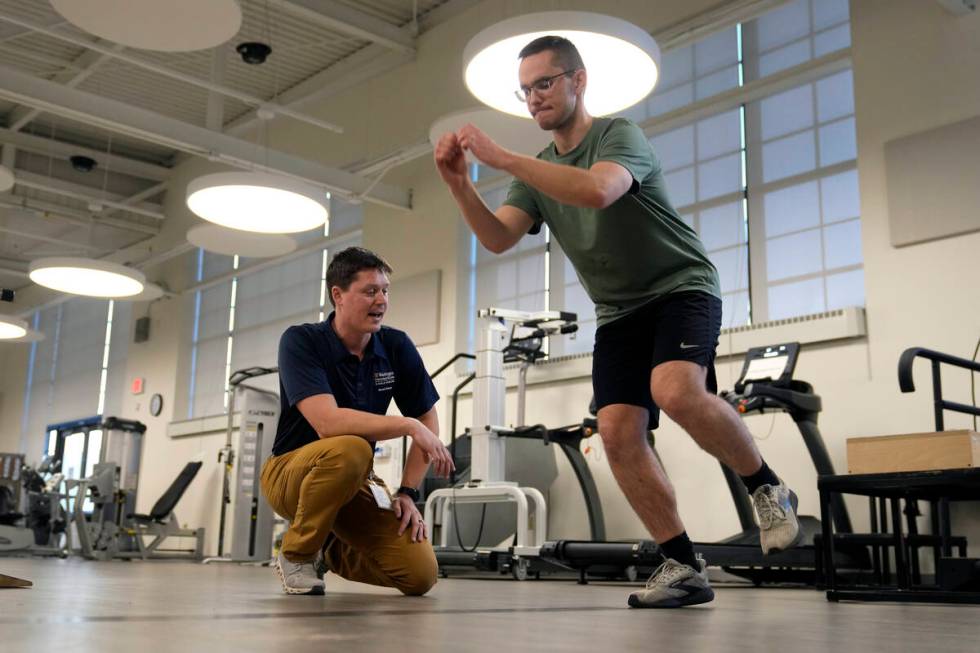What to know about health care’s ‘best-kept secret’

If you think physical therapy is only about rehabilitation after surgery or recovering from an accident, think again. For the vast majority, seeing a physical therapist should be about prevention, routine assessment and staying well.
“We’re the best-kept secret in health care,” says Sharon Dunn, the past president of the American Physical Therapy Association.
Roger Herr, the current president of the APTA, and Gammon Earhart, associate dean for physical therapy at the medical school at Washington University in St. Louis, echo Dunn’s prevention message.
“We need to change our image by getting out of our silos, out of our brick-and-mortar clinics,” says Dunn, who teaches at Louisiana State University.
The image of the profession tends to be one-dimensional. You’ve had knee surgery, your back keeps acting up or you’re injured and you’ve been referred by a physician to a physical therapist.
You go several times, you get an evaluation and you’re discharged with exercises to do and advice about how to move more efficiently.
“That’s a big chunk of what physical therapists do,” Earhart says. “But I think a lot of people don’t understand: They think when they have a major medical problem that a physical therapist is going to massage them until they feel better. That’s not what it is.”
Follow dental model
Many in the profession favor approaching physical therapy the same way we do dentistry: Patients make appointments for regular exams.
“Even if you’re not having any problem, you go in and have everything checked out,” Earhart says. “If there’s any problems that seem to be brewing, you head them off at the pass.”
An exam could include health history and current health — physical activity, sleep, nutrition, etc. This would be followed by a look at how you’re moving. It might include things like postural alignment and movement patterns as you walk, run, reach, sit and stand. In terms of strength and flexibility, think muscle imbalances.
Herr is a big backer of annual wellness visits. For all ages.
“Physical therapists can fit into all parts of the spectrum,” he says. “It can be for the young, emerging athletes or high-end athletes, or someone who wants to age well and be as functional and independent as possible.”
Think prevention
You can now visit a physical therapist in all 50 states without needing a referral from a physician or surgeon. That’s the good news.
“I just don’t think the public knows they can go to a physical therapist without a physician’s referral,” Dunn notes.
The bad news for an annual exam might be the price tag. These preventative visits are not usually covered by insurance. Earhart estimates that such a visit in the Midwest might cost $150 out of pocket. But an intervention like this might save expenses — and add healthy years — in the long run.
Herr, who is based in New York, would expect a cost of $200 to $300 in a more expensive part of the country.
“Surgery and accidents can still happen, but generally you’re on top of things with these visits,” Earhart says. “I think if people understood more that the way they move might be setting them up for a problem down the line, they’d be much more inclined to see a physical therapist.”
Hips for ballet — or not
We are all built differently with variations in hip architecture and so forth. It might be useful to evaluate children early to decide which sports or activities suit them. Testing beforehand to avoid a problem later is the perfect job for a physical therapist.
“If we screened kids as they were choosing sports and said this sport is probably not the right kind of stress for the way you are put together, it could save a lot pain and problems down the line,” Earhart says. “Maybe they don’t have the hips for ballet.”
Distance runners should think this way. Some are built more efficiently to avoid injuries despite racking up the miles. Others are not, and it would be good to know in advance.
Fear of falling
Falling — and the fear of falling — is debilitating for the aging population. Herr says that physical therapists can help with relatively simple interventions.
“You want to show people they can get back up if they fall,” he says. “And once they know they can do it, it gives them confidence and it can help reduce the fear of falling. One of the risks of falling is that people don’t do anything, so you don’t move and therefore you become more out of shape and not as functional.”
Herr notes that “floor to stand” movements involve flexibility, strength, balance and coordination. And planning.
“It sounds simple getting up from a lying position on the floor to stand,” Herr says. “But it’s a great exercise for all age groups.”
Issues with weight
Earhart estimates that perhaps 50 percent of physical therapy patients are there because of issues related to being overweight.
“Somebody does not have to be morbidly obese for their weight to be affecting their movement,” she says. “The more weight somebody is carrying the higher the loads are on their joints.”
Earhart says that she sees patients for “prehab” for weight-loss procedures known as bariatric surgery or gastric bypass. This involves the digestive system to limit how much patients can eat, or the ability to take in calories.
The surgery can also involve rehab visits.
Herr says that he’s watched obese patients drop weight. It can be a question of motivation, though it’s not always that straightforward.
“I have seen people change based on a milestone, like having a kid and they really want to be a good parent,” Herr says. “They want to be a fit parent, and the same thing with a grandparent. So that motivates people to engage because of a lifestyle change.”